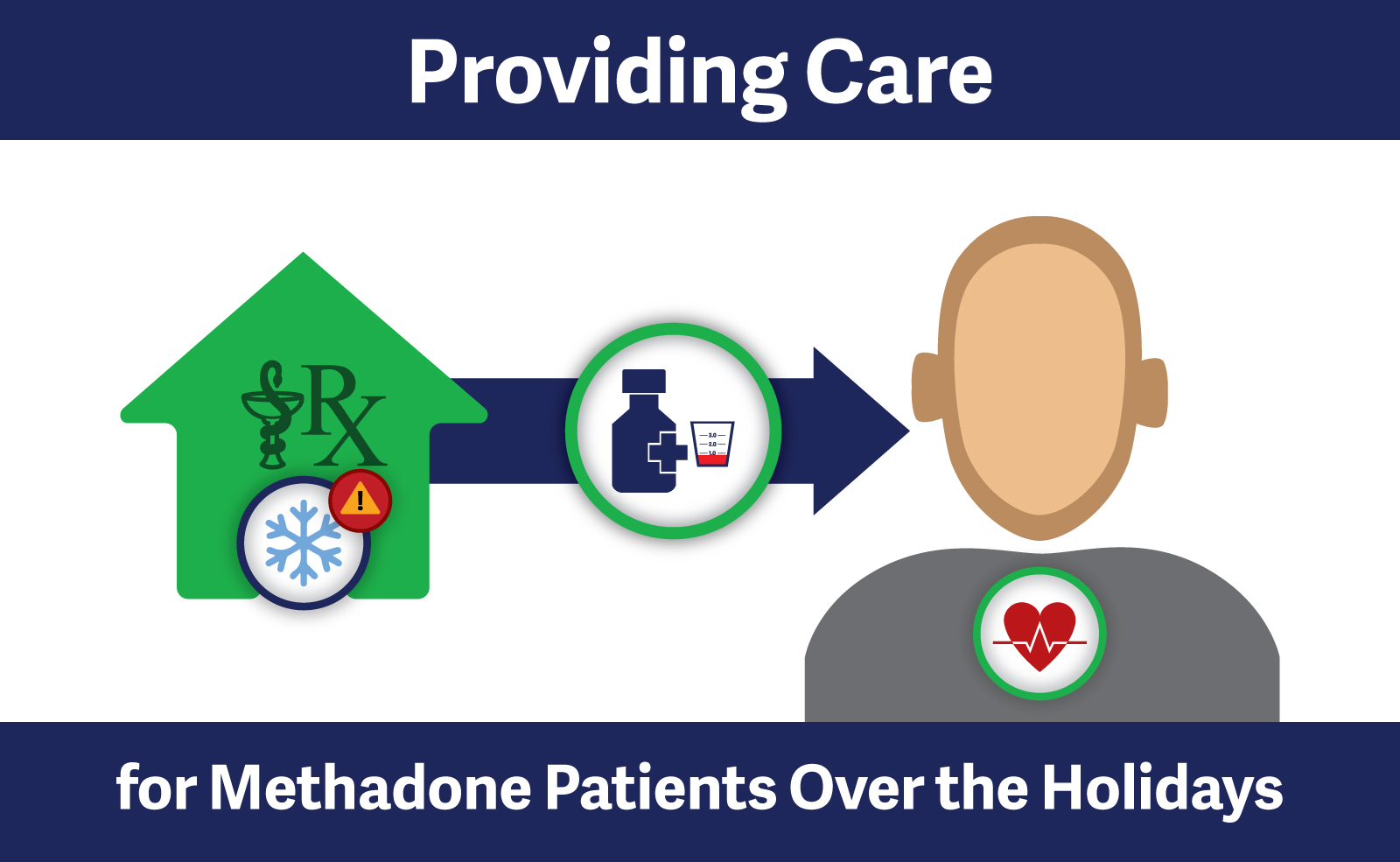Providing care for MMT patients over the holidays
With the holidays approaching and many pharmacies adopting shortened holiday schedules, it is important that pharmacists with MMT patients who require daily witness ingestion ensure that they are able to accommodate these patient’s dosing schedules.
Opioid dependence is a major health concern in BC, with implications for individual patients as well as the public.
Methadone Maintenance Treatment (MMT) is recognized internationally as among the most effective treatments for opioid dependency, and is widely used by individual patients across BC.
Many MMT patients in BC require supervised or witnessed dosing, meaning that their prescription requires them to visit their pharmacy in order to both obtain and ingest their daily dose of methadone under the supervision of a qualified pharmacist.
Pharmacists in BC MUST check the start and end dates of a prescription and ensure they can accommodate the patient BEFORE accepting the prescription. While a pharmacy may request a prescriber to write a prescription for carries to accommodate the holiday schedule, they must consider the patient’s needs first. For vulnerable patients, any changes to their normal schedule can be disruptive to their care and may leave them without needed support and monitoring.
If a pharmacy cannot accommodate a patient’s dosing schedule under their normal operating hours, they may refer the patient to another pharmacy or they may consider collaborating with their patients to arrange shorter opening hours on a holiday to ensure that patients receive their prescribed witnessed dose.
The College’s Policy Guide for Methadone Maintenance Treatment under Professional Practice Policy #66 outlines this using the following principles:
|
Principle 1.1.1 Patients must attend the pharmacy unless exceptional circumstances are provided for under Professional Practice Policy (PPP-71) – Delivery of Methadone Maintenance Treatment. The pharmacy hours of service must be consistent with the supervised dosing requirements of your patient. Guideline: When a pharmacy accepts a patient who requires daily witness ingestion (ie; 7 days per week) the pharmacy hours of service must accommodate this dosing requirement. A pharmacist does not have the independent authority to adapt a prescription for methadone maintenance treatment from ‘daily witness’ to a ‘take-home’ dose. |
|
Principle 3.1.3 Pharmacists and pharmacy technicians must review the prescription to ensure that it is completed by the prescriber as outlined in the Methadone Maintenance Controlled Prescription Form Guidelines (Appendix 3) and that the directions for use appropriately meet the specific needs of the patient and can be accommodated by the pharmacy. Guideline: Each prescription must be reviewed in detail in consultation with, and consideration given to the specific needs of, the patient. The following list is a sample only:
|
Any ambiguous or conflicting information identified must be clarified with the prescriber. Should an alteration or change to the prescription be required, it must be done in compliance with the Principles and Guidelines outlined in section 2.2 below.
|
2.2 Methadone Maintenance Controlled Prescription Forms – Alterations Principle 2.2.1 Alterations to the Methadone Maintenance Controlled Prescription form are the exception to the rule and should not be normal practice as they increase the likelihood of errors and drug diversion and put the public at risk. In the rare circumstance when an alteration is necessary to ensure the continuity of care pharmacists must always use due diligence to ensure authenticity and accuracy of the prescription. Guideline: Alterations completed at the prescriber’s office: Alterations are only permitted on the sections of the form that the prescriber completes provided that the prescriber has initialed the alteration. Alterations are not permitted to the pre-printed sections of the form. Alterations completed at the pharmacy: Pharmacists do not have independent authority to make any alterations or changes to a Methadone Maintenance Controlled Prescription form. Any required or requested change(s) must be patient-specific and authorized by the patient’s prescriber through direct consultation with the pharmacist. Any prescriber-authorized changes must be confirmed in writing, signed by the prescriber, received by the pharmacy (fax is acceptable) prior to dispensing the medication whenever possible and attached and filed with the original prescription.
|
More resources on the treatment of opioid use disorder:
RESOURCES
- A Guideline for the Clinical Management of Opioid Use Disorder (BCCSU)
- Webinar: Provincial Guidelines for the Clinical Management of Opioid Use Disorder (BCCSU)
- BC Center for Substance Use Education and Training
- Did you know? Buprenorphine/Naloxone (BCCSU)
- Did you know? Slow-release oral morphine (BCCSU)
- Frequently Asked Questions Buprenorphine/Naloxone Treatment (BCCSU)
- BC Center For Substance Use ReadLinks Series
- How to use Naloxone to Save a Life
- Methadone

 Share
Share



